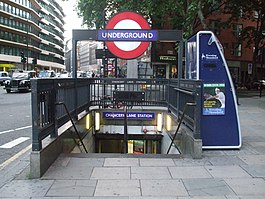Chancery Lane tube station
| Chancery Lane | |
|---|---|
 Northeastern entrance | |
 Chancery Lane Location of Chancery Lane in Central London | |
| Location | Holborn |
| Local authority | City of London London Borough of Camden |
| Managed by | London Underground |
| Owner | Transport for London |
| Number of platforms | 2 |
| Fare zone | 1 |
| London Underground annual entry and exit | |
| 2015 | |
| 2016 | |
| 2017 | |
| 2018 | |
| 2019 | |
| Key dates | |
| 30 July 1900 | Opened |
| Other information | |
| External links | |
| WGS84 | 51°31′05″N 0°06′40″W / 51.518°N 0.111°WCoordinates: 51°31′05″N 0°06′40″W / 51.518°N 0.111°W |
Chancery Lane is a London Underground station in between Holborn and the City in central London, England and is in the London Borough of Camden and the City of London.[4] It opened in 1900 and takes its name from the nearby Chancery Lane.
The station is on the Central line, between St. Paul's and Holborn stations, within fare zone 1.
It is located at the junction of High Holborn, Hatton Garden and Gray's Inn Road, with subway entrances giving access to the ticket office under the roadway. Chancery Lane is one of the few London Underground stations which have no associated buildings above ground.[5]
History[]
The station was opened by the Central London Railway (CLR) on 30 July 1900.[6] The current station entrance is not the original. The original, disused station building is on the north side of High Holborn at Nos. 31–33,[7] approximately 400 feet (122 m) to the west, closer to High Holborn's junction with Chancery Lane. Originally provided with four lifts between ground and platform levels, the station was rebuilt in the early 1930s to operate with escalators.[8] It was not possible to construct the inclined escalator shaft between the platforms and the existing entrance, so a new sub-surface ticket hall was constructed below the road junction. The new station entrance came into use on 25 June 1934.[8] The old entrance building became redundant and, in recognition of the location of the new entrance, the station was renamed Chancery Lane (Gray's Inn), although the suffix subsequently fell out of use.[6]
When the CLR excavated the running tunnels it routed them to avoid passing under surface buildings in order to limit the risk to the buildings from vibration. At Chancery Lane, the eastbound tunnel runs above the westbound one.[9]
It is one of eight Underground stations with a deep-level air-raid shelter underneath it; after World War II this was turned into Kingsway telephone exchange. Access to the shelter was via the original station building and lift shaft as well as subsidiary entrances in Furnival Street and Took's Court.[7]
Accidents and incidents[]
On 25 January 2003, a 1992 Stock train derailed at Chancery Lane, injuring 32 passengers, after a motor became detached from the train. All services on the entire Central line and the Waterloo & City line (which used the same type of train) were suspended, as the trains had to be taken out of service whilst the cause of the failure was determined and appropriate modifications made to the trains.[10]
Connections[]
London Buses routes 8, 17, 46 and 521 and night routes N8 and N25 serve the station.
Gallery[]

Chancery Lane original station building
Eastbound platform looking west
Westbound platform looking east

The second shortest escalator on the Tube network
Roundel, eastbound platform

Southern entrance
References[]
- ^ a b c "Multi-year station entry-and-exit figures (2007–2017)". London Underground station passenger usage data. Transport for London. January 2018. Archived from the original (XLSX) on 31 July 2018. Retrieved 22 July 2018.
- ^ "Station Usage Data" (CSV). Usage Statistics for London Stations, 2018. Transport for London. 21 August 2019. Archived from the original on 22 May 2020. Retrieved 27 April 2020.
- ^ "Station Usage Data" (XLSX). Usage Statistics for London Stations, 2019. Transport for London. 23 September 2020. Archived from the original on 9 November 2020. Retrieved 9 November 2020.
- ^ https://tfl.gov.uk/cdn/static/cms/documents/multi-year-station-entry-exit-figures.xls[permanent dead link]
- ^ Marshall, Geoff. "Tube Facts & Figures". GeoffTech. Archived from the original on 22 February 2017. Retrieved 15 December 2019.
- ^ a b Rose, Douglas (1999). The London Underground, A Diagrammatic History. Douglas Rose/Capital Transport. ISBN 1-85414-219-4.
- ^ a b Emmerson, Andrew; Tony Beard (2004). London's Secret Tubes. Capital Transport. p. 170. ISBN 1-85414-283-6.
- ^ a b Connor, J.E. (1999). London's Disused Underground Stations. Capital Transport. p. 122. ISBN 1-85414-250-X.
- ^ Clive's Underground Line Guides, Central Line, Layout
- ^ "Thirty hurt after Tube crash". 25 January 2003. Retrieved 27 May 2020.
External links[]
| Wikimedia Commons has media related to Chancery Lane tube station. |
- Rail transport stations in London fare zone 1
- Central line stations
- London Underground Night Tube stations
- Tube stations in the London Borough of Camden
- Former Central London Railway stations
- Railway stations in Great Britain opened in 1900
- Disasters on the London Underground
- Derailments in the United Kingdom
- Railway stations located underground in the United Kingdom






